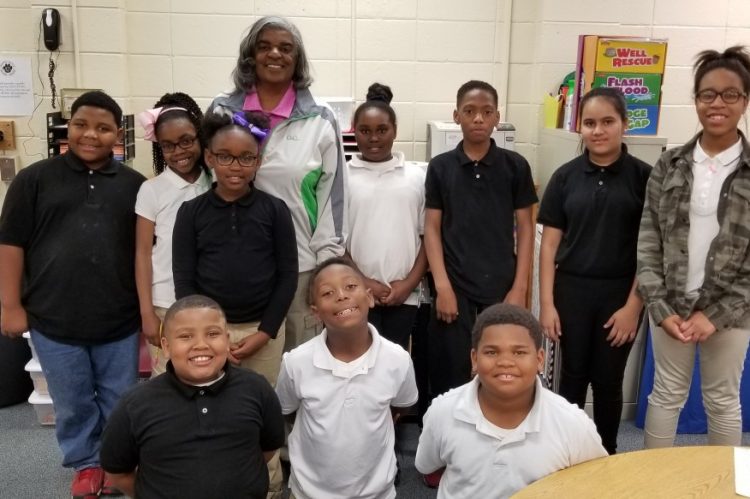Posted on 4/3/18 by Avis E. Williams
The Beginning…
The initial idea for a community project came as I served as Pastor of Community Transformation for Lake Oconee Community Church in Greene County, Georgia. I was finishing my Master of Divinity studies at Candler School of Theology, with plans of graduating in May 2008. The founding pastor of the church, David W. Key, Sr., called me in April 2007 to join him in ministry out in Greene County, initially as an intern. I said yes without visiting the community but was reading about asset-based community development during my internship. I began full time employment immediately after graduation. Pastor Key shared his vision of the ministry effort, that “he wanted the members of Lake Oconee Community Church to see God’s hand move in transforming the community.”[1] Lake Oconee Community Church is an affluent predominantly white congregation where more than 80% of it’s 300+ members live in gated communities around Lake Oconee, approximate 70 miles east of Atlanta, Georgia, in a rural community.
I was struck by the lack of summer activities for children at the local schools and that they were not getting daily breakfast or lunch. We started a Youth Alliance group, focused on historical, education, and cultural enrichment for youth ages 6-12 years old, in traditionally underserved communities around Greensboro Elementary School. The School system has an 80% free and reduced rate. The initial Youth Alliance group was 26 children meeting in the Afterschool building of the Sycamore Apartments, a public housing facility. Church volunteers shared life experiences with the youth and the school nutrition department provided breakfast and lunch daily for the students while they were out of school for the summer. One of our church volunteers brought tomato plants for each student and we began our physical growing campaign. The Youth Alliance membership grew in membership and church volunteers formed active mentor/mentee relationships with the youth. The meeting place moved to Greensboro Elementary School. Formerly separate communities with seemingly nothing in common, divided by their socioeconomic status began to talk to one another. Friendships were established between the mentors, mentees, and the mentees’ families, and the focal points of their gatherings were the well-being of the children and how to grow a healthier community through collaborative ministry and community partnerships.
The Project
In 2014 after viewing a documentary called A Place at the Table, I learned more about the crises of food insecurity and food deserts. The documentary was set in four or five geographical regions across the United States, and there was a community that reminded me of Greene County, Georgia. The family lived in the Mississippi Delta region. The documentary heightened my awareness and call to action. The affected families and communities banded together to find answers to the situations facing them surrounding food insecurity and food deserts. “Community building requires a concept of the leader who creates an experience for others-experiences that in themselves are examples of our desired future.”[2] I saw that it was possible to design and build the community that one envisions.
The Doctor of Ministry Program allowed me to lead in designing and creating a project that Greene County, Georgia might be a place that addresses public health, communal health, and community health, with the faith community taking the leadership role. The project addresses food justice and lack of access to healthy food. The project also talks about the role of the pastor leader to help communities care for and nurture the whole person and the whole community, regardless of socioeconomic status.
Peter Block writes that “youth are a unifying force in community.”[3] Health Incarnate started with Greensboro Elementary students coming together and stating their vision for their families, school, and community. Their contributions are valuable and necessary in growing a healthier community. The youth were and are the common denominator for the project. Youth are integral parts of community transformation as they are working collaboratively with adult volunteers. The youth are assets in the community and the community partners are willing to work with them.
Though one of the initial goals of the project was to address food insecurity, it was not the only goal. The Greensboro Elementary School principal, Dr. Jacqueline Jackson, invited us to start a garden club at the school. The students wanted to plant and grow a food garden yes, but they also wanted to grow healthier community. The garden club now meets monthly at Greensboro Elementary School.
Healthy communities are grown with intentionality by inviting cross sections to convene and participate in conversations, meetings, and the mapping of local resources. Health Incarnate is promoting health literacy through the physical, social, community, and emotional health of the Greensboro Elementary School community. The additional project partners are: Joseph Nesbitt, agricultural teacher at Greene County High School; a group of Greensboro Elementary School parents; TenderCare Clinic in Greensboro; the Greensboro Public Library; local farmer Jonathan Lamar; Targie Folds, Interim Food Service Director for Greene County Schools and the Executive Director for the Greene County Family Connection Partnership; Mr. Robert Motley and the Greensboro Housing Authority; local youth minister, Rev. Peter White; and the Mission Ministry of the Lake Oconee Community Church.
The youth are co-leaders in the project. They have learned how to conduct meetings and interviews. They also discussed the possibilities of church youth groups merging with adults to imagine how we can construct a healthier through ministry, education, and gardening. The youth suggested that a gardening action plan is the way to get all of the partners involved.
Youth Responses to Child Hunger…
The Greensboro Elementary School Community is located within a predominantly black, underserved community in Greensboro, Georgia. Targie Folds reported to us that 100% of the student population at Greensboro Elementary School eats breakfast at no cost.[4] Many of these students live in the three sets of public housing apartments, two sets of subsidized housing apartments, and many rental houses within a one-mile radius of the school.[5] Children in the greater Greensboro Elementary School and their families are suffering from food insecurity and have little or no medical or dental insurance. The project partnership now includes dentists and physicians from TenderCare that are teaching health and healthy living at the Clinic and the school.
Health Incarnate met the food insecurity crisis head on and the idea of a garden emerged. Community transformation in the project may decrease the dire condition of hunger that is present in the community as classroom and community gardens have been planned and are starting in April 2018. Cabbage plants will be donated and will be planted by the students and the community volunteers.
This project is an opportunity to point to Christ’s presence in community in biblical reflection as a model and one of the guiding forces behind communal practices. Jesus spent time in conversation and fellowship with persons in community. Health Incarnate demonstrates how food and faith are vital ingredients for engaging the Greensboro Elementary School community in not only productive conversations, but actions of planting, all spearheaded by the garden club at their monthly meetings.
Community ill-health is a subset of poverty. The youth met with the faith community partners and then joined the community resource directory network, to be published in late Summer, 2018. The youth felt that the community’s ill-health was related to socioeconomic conditions. Generative themes of illness and poverty came out of initial group discussions. They viewed a couple of documentaries about youth in impoverished communities speaking about hunger and the lack of food in their homes and families. Health Incarnate suggests that the partnership between the faith community and other community groups in discussion first, then specific projects like gardening and growing, will move them towards transformation.
Project Findings
The Greensboro Elementary School community is being rebuilt and transformed from the inside out. The youth are community assets and have provided renewed energy to push the project forward. Their excitement has caught on with the volunteers. A healthier community is evolving in Greene County, Georgia. Rev. Peter White is the local youth ministry leader and is convening and leading community conversations about food justice.
The community food desert is about the lack of resources, i.e. educational, nutritional, social, and spiritual, facing persons living in poverty in Greene County. John Kretzmann and John McKnight write that “when youth become connected in a positive manner with the community in which they live, they can become effective mobilizers of one another, and en masse can be powerful agents of community revitalization.”[6] The garden club is excited about growing healthier vegetables and the collaborative partnerships are growing the community closer together. Health Incarnate is working to ensure the community will be enlivened as well with shared resources, including the knowledge gained of how to plant, nurture, grow, and harvest.
The garden club parents were invited to participate and talk about the goals of the club. They came and committed to the project. They are working with their children to distribute information about health and nutrition via word of mouth and social media. There is work for all persons at the community table of involvement. The project has not been a youth or adult one but a youth and adult project working together to grow the future they would like to see. Parents and children have found common conversation around food and healthy bodies.
Healthy food is not always accessible to persons in poverty. Full service grocery stores or supermarkets are not in the Greensboro Elementary School neighborhood. Many families shop at the local convenience stores for their families needs, where prices are higher and fresh foods, especially vegetables, are not always readily accessible. Often, the drive is 15-20 miles to shop at the full service grocery store, to purchase fresh bread, milk, and vegetables.
The project’s first gardening attempt was to grow tomatoes in pots at the school. This was Phase One and the students grew tomatoes, took them home and the tomatoes were part of their meals. But the real growing exercises were between the Lake Oconee Community Church volunteer, who was a master gardener, and the youth club members. They all learned from each other. The garden and conversation moved from the school to the homes of both the church membership and the garden club members.
The ministry of this project has and is encouraging community members to come together for the good of the body, regardless of socioeconomic status. Jesus Christ, member of the Triune God, was the one member of the Trinity who had a body because of the Incarnation. Jesus experienced human vulnerability, illness, and sufferings, political and social injustice and oppression. The project works to attend to the needs of the community’s suffering.
The Future…
The garden club students think that health should be taught as a pat of their school curriculum. They do not want their friends or anyone else to suffer from food insecurity, if it can be helped. They do not want their friends to die from a sickness possibly caused by a lack of social or physical resources. Health Incarnate is a way to model community involvement with one’s neighbors, especially local school. Greensboro Elementary School principal Dr. Jacqueline Jackson committed and has supported the Health Incarnate project working through the garden club. The club is a grass roots effort and will continue to empower the youth to make sure that a cross-section of the community works together that this project model might be duplicated in other communities, especially in rural communities.
The Conclusion
Youth Ministry works! The first plants have been planted, harvested, and eaten. The group has been organized, with plans for meeting and membership growth in place. Phases Two and Three are in place, there will be a raised bed garden in the fall of 2018 and community plots have been identified on school property for the school garden. The students have journals and will write about the journey to a healthier community. The local high school video department will detail the progress of the project for information and instructional purposes.
The project is a faithful response to the age old problem of poverty, need, and food insecurity in the greater Greensboro Elementary School community. Health Incarnate looked at the statistics like Kid President suggested in the video and the group got involved to grow a healthier community. The pastor leader has a vital role in building a healthier community. The engagement of youth and community volunteers produced positive results. Relationships developed between persons from the gated and non-gated communities, with both being receptive to hearing and learning from each other.
The despairing statistics of food insecurity, discrimination, and injustice have not completely gone away. There are still health related conditions in young persons that need to be improved. Efforts like the Health Incarnate project will decrease health disparities over time as all remain vigilant and committed. Community leaders partnered with local churches and now there are health fairs to address health disparities. Retired physicians from the gated community are now speaking at churches talking about a healthier Greene County. The youth are disseminating information about health and nutrition at the church sponsored health fairs while the pastors are teaching and preaching about justice in the community.
The Health Incarnate project provided first hand witness accounts that elementary school students could lead a project to realize a more connected Greene County, regardless of socioeconomic status or faith beliefs. The theory of community abundance was realized throughout the project. The community has the answer to helping the despairing conditions become better ones.
[1] David W. Key, Sr., conversation with author, April, 2007. [2] Peter Block, Community: The Structure of Belonging (San Francisco: Berrett-Koehler Publishers, Inc., 2008), 86.[4] Targie Folds, interview by author, February 21, 2018.
[5] Targie Folds, interview by author, March 6, 2018.
[6] John P. Kretzmann and John L. McKnight, Building Communities From the Inside Out: A Path Toward Finding and Mobilizing A Community’s Assets (Chicago, ACTA Publications, 1993), 31 .




Wonderful! Avis this sounds like a fabulous project that is rooted in love and beneficial for the entire community. Good luck!
Renee